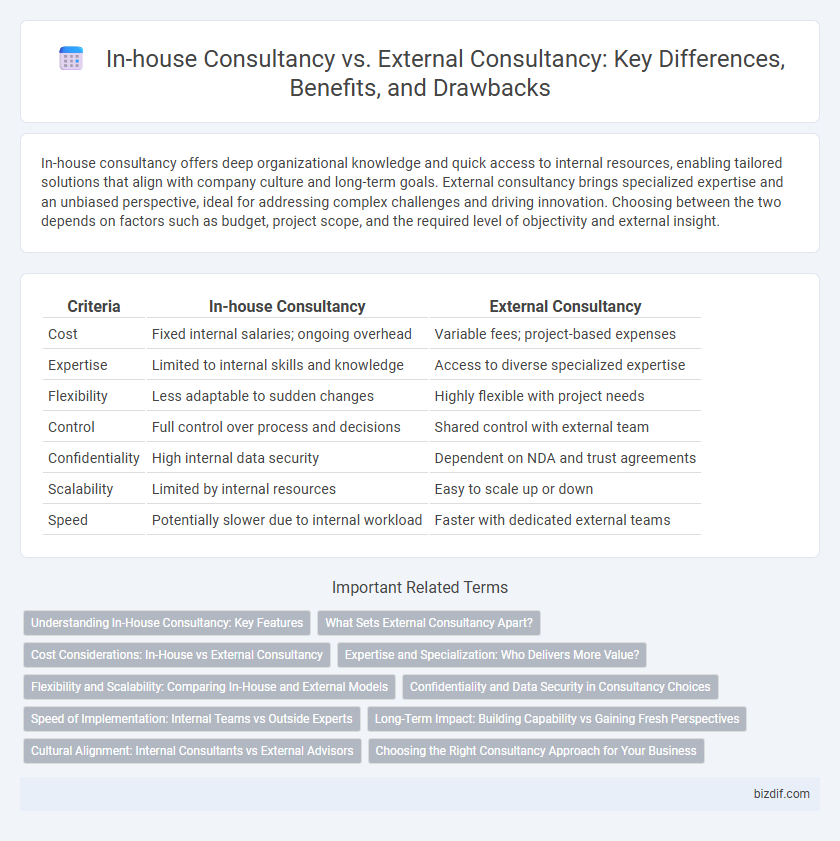In-house consultancy offers deep organizational knowledge and quick access to internal resources, enabling tailored solutions that align with company culture and long-term goals. External consultancy brings specialized expertise and an unbiased perspective, ideal for addressing complex challenges and driving innovation. Choosing between the two depends on factors such as budget, project scope, and the required level of objectivity and external insight.
Table of Comparison
| Criteria | In-house Consultancy | External Consultancy |
|---|---|---|
| Cost | Fixed internal salaries; ongoing overhead | Variable fees; project-based expenses |
| Expertise | Limited to internal skills and knowledge | Access to diverse specialized expertise |
| Flexibility | Less adaptable to sudden changes | Highly flexible with project needs |
| Control | Full control over process and decisions | Shared control with external team |
| Confidentiality | High internal data security | Dependent on NDA and trust agreements |
| Scalability | Limited by internal resources | Easy to scale up or down |
| Speed | Potentially slower due to internal workload | Faster with dedicated external teams |
Understanding In-House Consultancy: Key Features
In-house consultancy involves consultants who are permanent employees within an organization, providing specialized expertise tailored to the company's specific needs and culture. These consultants offer continuous support, deep organizational knowledge, and quicker response times compared to external counterparts. Key features include integrated team collaboration, alignment with corporate strategies, and cost efficiency from long-term internal resource utilization.
What Sets External Consultancy Apart?
External consultancy excels through specialized expertise across diverse industries, offering fresh perspectives unattainable within in-house teams. Their access to cutting-edge tools and best practices enables tailored solutions that drive strategic innovation and operational efficiency. Moreover, external consultants provide objective, unbiased insights that help organizations navigate complex challenges and accelerate transformation initiatives.
Cost Considerations: In-House vs External Consultancy
In-house consultancy often incurs fixed costs related to salaries, training, and infrastructure, making it more cost-effective for long-term, ongoing projects. External consultancy typically involves higher hourly rates and additional expenses such as travel and reporting but offers flexibility for specialized expertise and short-term needs. Careful cost-benefit analysis considering project scope and duration is essential for optimizing consultancy expenditures.
Expertise and Specialization: Who Delivers More Value?
In-house consultancy offers deep organizational knowledge and tailored expertise that aligns closely with company culture and long-term goals, enabling faster issue resolution and strategic consistency. External consultancy provides specialized skills and industry-best practices that may be unavailable internally, delivering fresh perspectives and cutting-edge solutions for complex challenges. Companies seeking innovative, niche expertise often gain more value from external consultants, while those prioritizing seamless integration and internal capacity-building benefit from in-house teams.
Flexibility and Scalability: Comparing In-House and External Models
In-house consultancy offers consistent availability and deep organizational knowledge but may face limitations in scalability and adapting to diverse project demands. External consultancy provides greater flexibility and scalability, allowing businesses to access specialized expertise on an as-needed basis without long-term commitments. Balancing these models enables organizations to optimize resource allocation while maintaining agility in responding to evolving consultancy needs.
Confidentiality and Data Security in Consultancy Choices
In-house consultancy offers greater control over confidentiality and data security by restricting access to sensitive information within the organization's internal environment. External consultancy requires rigorous vetting and secure data exchange protocols to mitigate risks associated with third-party breaches and unauthorized disclosures. Choosing between in-house and external consultancy hinges on balancing operational expertise with robust data protection measures tailored to the organization's security policies.
Speed of Implementation: Internal Teams vs Outside Experts
Internal consultancy teams typically enable faster implementation due to their deep understanding of company culture, processes, and real-time access to key stakeholders, reducing onboarding time significantly. External consultancy firms, while bringing specialized expertise and best practices, often require an initial phase for knowledge transfer and alignment with internal systems, potentially slowing early progress. Speed of implementation ultimately depends on the complexity of the project, the readiness of internal teams, and the consultants' ability to integrate seamlessly with existing workflows.
Long-Term Impact: Building Capability vs Gaining Fresh Perspectives
In-house consultancy fosters long-term capability by embedding expertise within the organization, enabling continuous improvement and tailored strategic development. External consultancy offers fresh perspectives and specialized knowledge that can identify blind spots and innovate rapidly but may lack sustained integration into company culture. Balancing both approaches ensures sustained growth while leveraging innovative insights for competitive advantage.
Cultural Alignment: Internal Consultants vs External Advisors
Internal consultants possess a deep cultural understanding of the organization, enabling seamless communication and alignment with corporate values, which enhances project acceptance and execution. External advisors often bring diverse industry insights but may face challenges in adapting to the client's specific organizational culture, potentially causing friction or slower integration. Cultural alignment significantly impacts the effectiveness of consultancy outcomes, with internal teams typically fostering stronger trust and collaboration compared to external consultants.
Choosing the Right Consultancy Approach for Your Business
Selecting between in-house consultancy and external consultancy hinges on factors such as budget, project complexity, and desired expertise. In-house consultants provide intimate knowledge of company culture and quicker access to internal resources, enhancing alignment with organizational goals. External consultancies offer specialized skills and an unbiased perspective, ideal for tackling complex challenges or when internal capacity is limited.
In-house consultancy vs External consultancy Infographic

 bizdif.com
bizdif.com